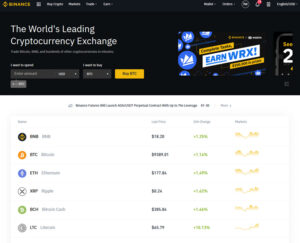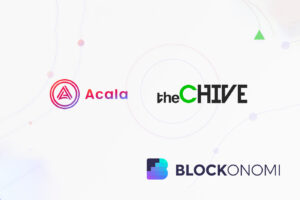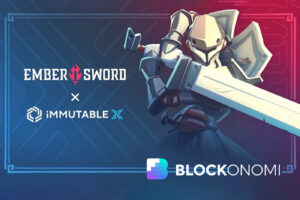
BlockWallet is a private, non-custodial Ethereum browser extension wallet that allows you to hide the amounts and the origins of cryptocurrency held by easily interacting with privacy smart contracts on Ethereum which is a decentralized, non-custodial, and frictionless manner.
The platform is an innovative solution that has met the increasing demand for privacy and anonymity. Its one-of-a-kind solution will create a new wallet address for you with the amount of crypto that you requested when you make a withdrawal.
This is achieved by using cryptographic proofs to ensure that the user cannot be linked with the original depositing address.
What Is BlockWallet?
With the boom of blockchain technology in finance, assets are no longer the picture of physical assets such as gold, art, wills, bonds, stock certificates, or cash which are carefully stored in a bank to secure.
Although you can keep all those assets away from thieves, it takes a lot of time to approach the market such as for sale or trade.
On the other hand, digital assets have opened a new era for more quick trade and easy hold in global economics.
As a result, many blockchain-based banking platforms with digital banking bringing traditional and blockchain banking services are increasingly born to meet the demands.
These services are more efficient and can facilitate real-time settlement, bringing down transaction costs, counterparty risk, and capital efficiency.
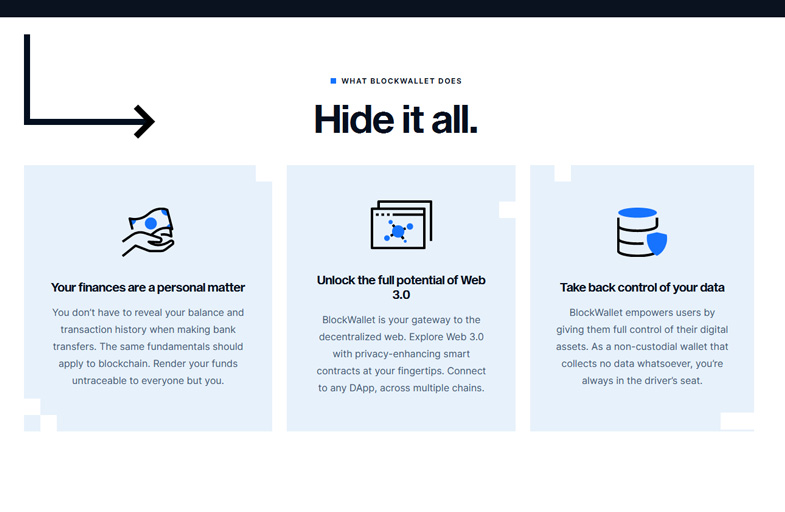
However, it can be denied that hackers’ attacks have got sophisticated as well, making banking platforms unable to stop improving their technology. Projects like BlockWallet continue to push innovation for asset management.
BlockWallet is able to ensure total crypto security and anonymity for you as well as is the most private, non-custodial cryptocurrency wallet.
Launched in 2020 by a group of tech consultants, software engineers, and developers who want to disrupt the most modern technology – blockchain, BlockWallet is a vision of the team to create the future of DeFi.
In addition to the smart contract functionality, the platform also integrates with Tor for a higher level of privacy. Functionality is going to be launched including DeFi web3 integrations as well as support for Metamask Snaps Plugins to allow for seamless connectivity and usage.
What is the BlockWallet Solution?
The cryptocurrency industry has challenged users’ perceptions towards the way financial operations are done.
While the values and beliefs in the immutability of blockchain technology are highly appreciated which is still the leading benefit sought after by people when participating in any DeFi activities, transparency is on the contrary.
Today, protecting one’s assets gets more attention than before. If given the option, users may choose to remain anonymous over revealing themselves and their wealth.
Unfortunately, users often must experience friction or deal with centralized entities when they want to keep less transparent and anonymous when participating in DeFi ventures with existing solutions.
Understanding these demands, BlockWallet is designed to offer real privacy for your cryptocurrency. Also, this means it allows you to reclaim your financial privacy on the blockchain.
The biggest problem that the platform has recognized is how everything can be tracked.
Did you know?
Anyone can access your dApps when you’ve connected your wallet. As such, people not only can know all your history transfers but also know how much crypto you have in your wallet.
To keep you safe from exposing yourself in each crypto transaction, BlockWallet develops a system that adds the ultimate protective layer to your crypto transactions along with other functions that other wallets offer in the market.
It’s a non-custodial Ethereum browser extension wallet focusing on privacy. In other words, users hide amounts and origins of funds by interacting with privacy smart contracts.
Each transaction is made to a newly generated wallet address and uses cryptographic proofs to break links between the user and the original deposit address.
Therefore, it can be seen that this browser extension breaks links between users and funds, adding an extra and necessary privacy layer to all activities.
The more the adoption of blockchain users is common, the more the problem with privacy is increased. With BlockWallet, you have rights to your privacy which shouldn’t be “opt-in”, but something you could occasionally “opt-out”.
Why BlockWallet?
As mentioned before, BlockWallet’s built-in privacy is currently a one-of-a-kind solution that the market hasn’t seen in the past.
It is also an advantage over existing competitors in the cryptocurrency industry like Tornado.Cash which also uses smart contracts, or Metamask, is a private but not anonymous wallet.
The wallet focuses on anyone who wants to store their crypto non-custodial and in a private way. While the recent hacker attacks are showing the frightening trend as you don’t know who will attack, the non-custodial wallet brings value to you with the untouchable privacy benefit.
How to Use BlockWallet?
BlockWallet is designed with a simple user interface. You can easily download the wallet from the Google Chrome store and install the extension in their browser.
Then, they can interact with any DApp and store their crypto which is like with any non-custodial wallet.
BlockWallet’s privacy pools use smart contracts to group the userbase’s funds together. Funds are deposited into a smart contract which can be later withdrawn to a new address. Also, zkSnark technology proves that users deposit their funds into the contract.
Every time you withdraw your funds, BlockWallet creates a new wallet address for you that contains the amount of cryptocurrency you requested. Transfers are implemented within the pool to ensure that they always are anonymous and untraceable.
BlockWallet will charge a 0.25% withdrawal fee for all transactions taken through the BlockWallet privacy pool. Other features without requesting privacy are going to be free.
BlockWallet Token
The native token of BlockWallet is $BLANK. Not only providing liquidity for the development of the wallet but the token also powering in its marketing activities.
The $BLANK token is mainly used to obtain additional benefits in the wallet and to monetize its value.
In addition, there are various ways for BLANK token holders to get the benefit when using, including fee reduction, token burn, rewards, exclusive features, “Access-First” functionality, and many more.
To date, the total supply is 125,000,000 tokens.
How to Buy the BlockWallet Token?
Although BLANK has been listed on a number of crypto exchanges, BLANK is an altcoin that requires you to transfer your coins to an exchange where BLANK can be traded. It cannot be directly purchased with fiats like other major cryptocurrencies.
To buy BLANK, you must first buy Bitcoin, ETH, or USDT from any exchange then use it to buy BLANK.
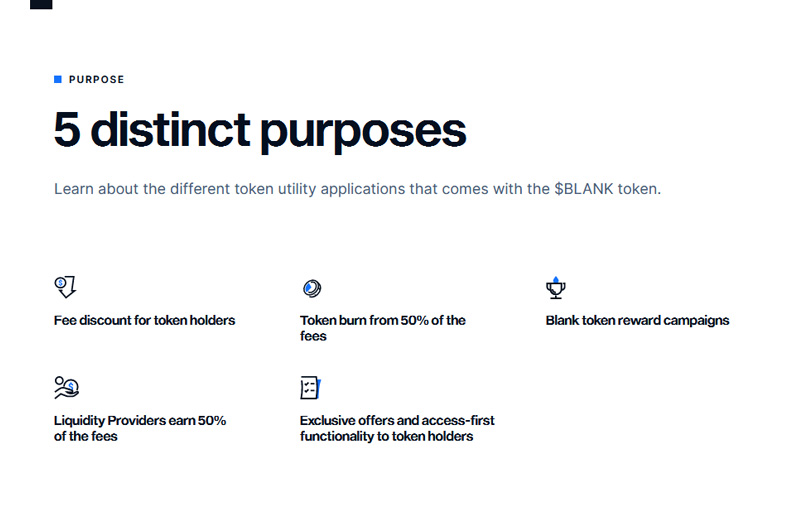
When the KYC process is finished, you will be asked to add a payment method. Depending on the crypto exchanges, you can use a credit/debit card or a bank transfer to make payment and buy one of the major cryptocurrencies such as Bitcoin, ETH, or USDT.
Then, transfer your cryptos to an exchange that BLANK can be traded.
Once finished you will need to make a BTC/ETH/USDT deposit to the exchange to purchase BLANK from the exchange.
Buy $Blank from:
- Uniswap (Ethereum): https://app.uniswap.org/#/swap?inputCurrency=ETH&outputCurrency=0x41a3dba3d677e573636ba691a70ff2d606c29666
- Quickswap (Polygon): https://quickswap.exchange/#/swap?inputCurrency=0x2791bca1f2de4661ed88a30c99a7a9449aa84174&outputCurrency=0xf4c83080e80ae530d6f8180572cbbf1ac9d5d435
- Gate (CEX): https://gate.io/trade/BLANKV2_USDT
- MexC (CEX): https://www.mexc.com/exchange/BLANKV2_USDT
BlockWallet is Here to Help!
Cryptocurrency banking platforms or cryptocurrency vaults have become popular and make a new future for asset management. Not only is crypto held in a vault where it can be kept safe but it is also used to generate yield over time.
BlockWallet has opened better privacy in the wealth management space. As more and more people turn to managing their wealth via cryptocurrency, it can be seen that achieving privacy becomes all the more important.
To learn more about BlockWallet – please click here!
The post BlockWallet: A Private & Non-Custodial Cryptocurrency Wallet appeared first on Blockonomi.
- "
- 000
- 2020
- About
- access
- achieved
- activities
- Additional
- address
- Adoption
- ADvantage
- All
- All Transactions
- Altcoin
- amount
- amounts
- Anonymity
- approach
- Art
- asset
- asset management
- Assets
- auto
- Bank
- Banking
- benefits
- Biggest
- Bitcoin
- blockchain
- blockchain technology
- blockchain-based
- Bonds
- boom
- browser
- buy
- buy bitcoin
- capital
- Cash
- certificates
- charge
- Chrome
- Coins
- Common
- competitors
- Connectivity
- contains
- continue
- contract
- contracts
- Costs
- could
- Counterparty
- crypto
- Crypto Exchanges
- cryptocurrencies
- cryptocurrency
- Cryptocurrency Wallet
- dapp
- DApps
- deal
- decentralized
- DeFi
- Demand
- developers
- Development
- digital
- Digital Assets
- digital banking
- Display
- Disrupt
- down
- easily
- Economics
- efficiency
- Engineers
- ETH
- ethereum
- everything
- exchange
- Exchanges
- Exclusive
- experience
- Features
- finance
- financial
- First
- Free
- functionality
- funds
- future
- generate
- Global
- going
- Gold
- Group
- hacker
- here
- Hide
- highly
- history
- hold
- holders
- How
- HTTPS
- implemented
- important
- In other
- Including
- increased
- industry
- Innovation
- innovative
- integrations
- Interface
- IT
- KYC
- leading
- LEARN
- Level
- Liquidity
- Listed
- major
- Making
- management
- Market
- Marketing
- MetaMask
- most
- offer
- One-of-a-Kind
- Operations
- Option
- Other
- payment
- People
- physical
- picture
- platform
- Platforms
- plugins
- Polygon
- pool
- Pools
- Popular
- privacy
- private
- Problem
- process
- projects
- Protective
- proves
- purchase
- real-time
- Rewards
- Risk
- safe
- sale
- seamless
- security
- Services
- settlement
- Simple
- smart
- smart contract
- Smart Contracts
- Software
- Solutions
- something
- sophisticated
- Space
- stock
- store
- supply
- support
- system
- tech
- Technology
- Through
- time
- together
- token
- Tokens
- Tor
- trade
- traditional
- transaction
- Transactions
- Transparency
- Uniswap
- USDT
- users
- value
- Vault
- Ventures
- vision
- Wallet
- Wallets
- Wealth
- wealth management
- Web3
- WHO
- within
- without
- words
- Yield




